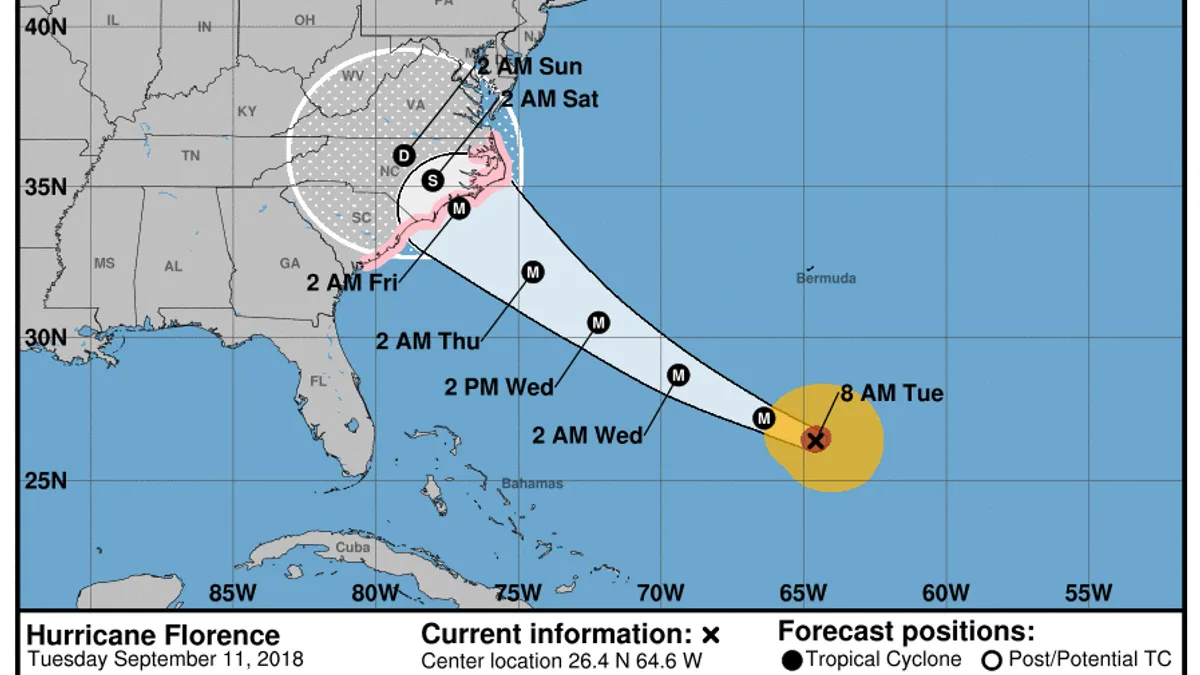Dive Brief:
- The Coast Guard, along with the captains at each port, have designated the Ports of Wilmington and Charleston in North and South Carolina, respectively, at condition "X-Ray," meaning gale force winds are expected within 48 hours. The ports of Norfolk and Savannah remain at condition 'Whiskey,' but will almost surely advance as the storm moves closer.
- Multiple reports indicate Virginia, North Carolina and South Carolina will all be closed after the gates close this evening. "Whatever is not moving out of Charlestown today — forget about it," said Mark Bartmann, senior director of sea freight drayage solutions at Kuehne + Nagel.
- South Carolina Governor Henry McMaster has ordered a mandatory evacuation for all of the state's coastal counties beginning Wednesday Sept. 12 at noon. Virginia, North Carolina and South Carolina have all declared states of emergency.
The Coast Guard's port conditions determine when East Coast ports close ahead of Florence
| Whiskey | Gale force winds are expected to arrive at the port within 72 hours. | Port remains open to all commercial traffic. |
| X-Ray | Gale force winds are expected within 48 hours. | Port remains open to all commercial traffic. |
| Yankee | Gale force winds predicted within 24 hours | Vessels seeking to depart must arrange immediate departure. |
| Zulu | Gale force winds within 12 hours. | The port is closed. |
SOURCE: Trade Winds
Dive Insight:
"This could be the first category 4 hurricane to make landfall in the Carolinas since Hurricane Hugo [in 1989]," said Governeor McMaster in a televised briefing impressing upon South Carolinians to obey mandatory evacuation orders on Monday.
Ports are staying open extra hours to move product out, especially a concern in South Carolina where major arteries will become one-way away from the coast starting at noon Sept. 12, and roadways will become clogged as the evacuation order goes into effect. "There's no way we’re sending truckloads on back roads," he said.
Though not all of these affected ports have made formal announcements, Bartmann said to expect them to close beginning Tuesday evening until at least Friday, but most likely Monday. His largest concern is that the storm will swing North and douse the Port of Norfolk and even the Port of Baltimore.
"Norfolk could be affected harder because if the storm moves north, then there could be an enormous amount of rainfall similar to Harvey,"said Bartmann.
These East Coast ports have grown in significance in recent years — the Port of Charleston had the highest monthly container volume in its history on Monday, handling 177,728 TEUs.
Though September is usually peak season, reports indicate shippers brought in their major shipments early to avoid tariffs. Still, should Florence reach a category five as some say it will, it could be much more disruptive to U.S. supply chains than Hugo before it.














